The Winner NCERT Solutions | English for Class 6 PDF Download
| Table of contents |

|
| Let us do these activities before we read |

|
| Let us discuss |

|
| Let us think and reflect |

|
| Let us Learn |

|
| Let us Listen |

|
| Let us speak |

|
| Let us write |

|
| Let us Explore |

|
Let us do these activities before we read
Page 115
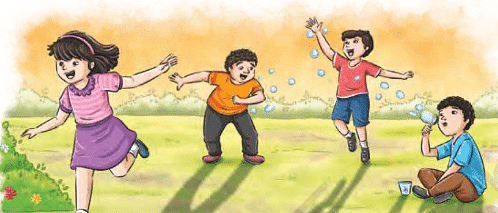
(a) What are these children doing?
Ans: The children are playing in the field, likely engaging in a sport or game.
(b) Where do you think they are?
Ans: They are in an open field or a playground.
(c) What is the time of the day?
Ans: It appears to be evening, as the sky is turning dark.
Q2: Discuss the given questions with your classmates and teacher. You may begin your sentences with—
I go to ...
I play with ...
The place I go to for playing ...
I like playing ...
Sometimes I come back ...
(a) When do you go to play after school?
Ans: I go to play after school around 5 PM.
(b) Who do you play with?
Ans: I play with my friends from the neighborhood.
(c) Where do you go to play in the evening?
Ans: I go to the local playground in the evening.
(d) Which games do you like playing?
Ans: I like playing football and cricket.
(e) When do you come back home?
Ans: I come back home around 7 PM.
Let us discuss
Page 116
Q1. Read the given lines from the poem. Write the meaning of the lines by identifying the words/expressions in them.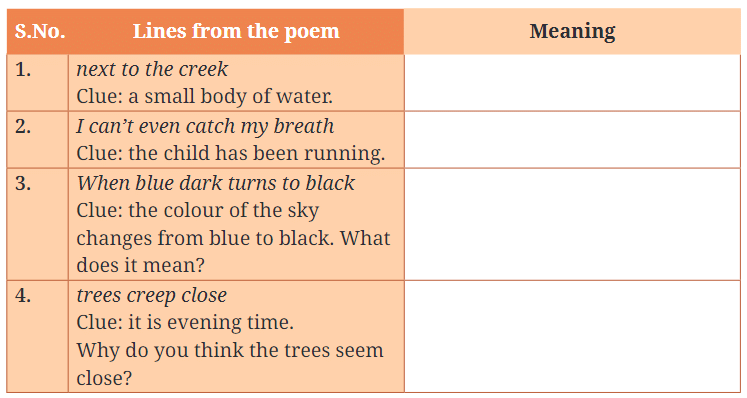
Ans: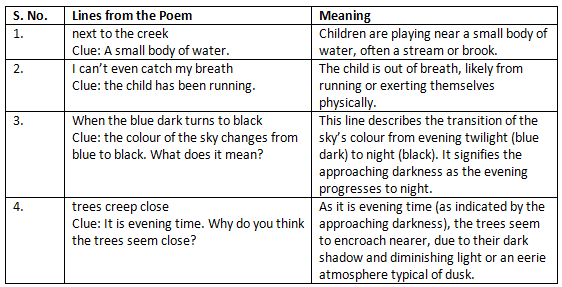
Q2: Read the poem. Complete the following based on the poem.
The children play ______________ in the ______________ in the neighbor’s ______________. They run so ______________ that they run out of breath. They continue to play till the evening when the blue sky turns ______________, and the trees are not visible. They can feel their feet ______________, now that it is cold. Finally, they stop ______________ and go home as it is night.
Ans: The children play ball in the evening in the neighbor’s field. They run so fast that they run out of breath. They continue to play till the evening when the blue sky turns black, and the trees are not clearly visible. They can feel their feet aching, now that it is cold. Finally, they stop playing and go home as it is night.
Let us think and reflect
Page 117
(i) Complete the sentence given below with the correct option.
The speaker needs to catch her breath because ________________.
a. everyone decides to walk
b. all the friends wish to go home
c. running fast results in being breathless
d. they need to do breathing exercises
Ans: (c) running fast results in being breathless.
(ii) Is the speaker alone? Why do you say so?
Ans: No, the speaker is not alone because the use of "we" indicates that there are others with the speaker.
(iii) What does the pattern in the lines tell us?
Ans: The pattern in the lines emphasizes the speed and intensity of their play, showing how breathless the speaker becomes from running fast.
(b) When blue dark turns to black,
cold grass aches our feet,
trees creep close—
game’s over.
Night wins!
(i) Give one reason why the grass is cold.
Ans: The grass is cold because it is evening and the temperature has dropped.
(ii) Complete the sentence suitably. The children’s feet are aching because ________________.
Ans: The children’s feet are aching because they have been running on the cold grass for a long time.
(iii) Why does ‘Night’ win?
Night wins because the ___________________________.
a. time for play has ended
b. children are tired
c. time to play at home begins
d. night follows day
Ans: (a) Night wins because the time for play has ended.
Let us Learn
Page 118
Q1: Read the information given in the table and see what the poet has done in the poem ‘The Winner’.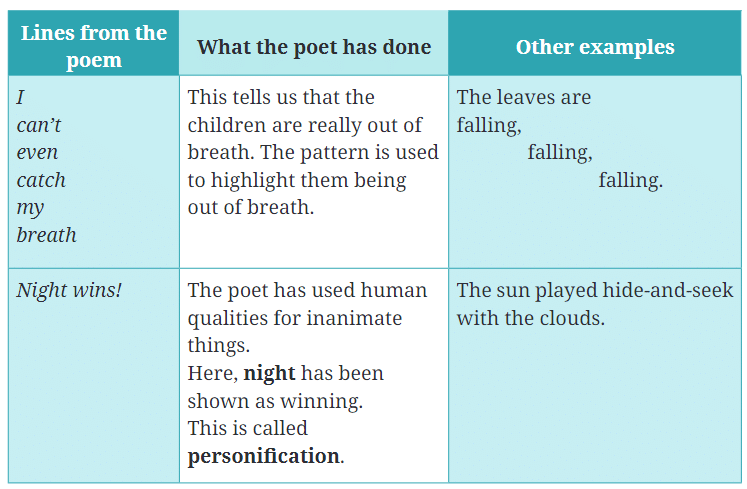 Now, try to write some examples of your own for both. Use your imagination when creating these examples.
Now, try to write some examples of your own for both. Use your imagination when creating these examples.
Ans: Examples:
- The river sang a soothing song as it flowed gently.
- The stars twinkled mischievously in the night sky.
 Ans: Lake, River, Sea, Pond, Ocean, Stream.
Ans: Lake, River, Sea, Pond, Ocean, Stream.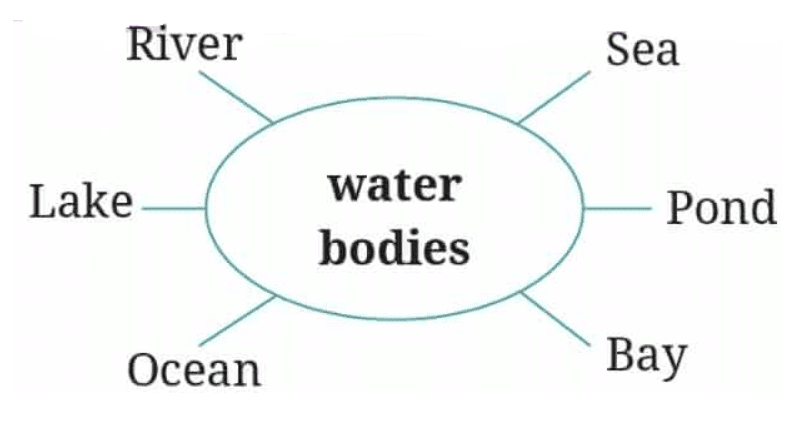
Let us Listen
Page 119

Riddle 1
Run and pass, run and pass
Kick a black-and-white ball
Kick it straight into the goal
Watch for mud—don’t fall
What sport am I?
Riddle 2
Hold your breath, say Hu-tu-tu,
till you touch one or two.
Take care to keep a distance wide
As you run back to your team’s side.
Which sport am I?
Riddle 3
In the water, hold your breath,
The water is very cool,
Arms turn, legs kick
In the blue pool.
Which sport am I?
Riddle 4
Breathe in, breathe out!
Practice every day just right,
You will be healthy and fit
Get energy and grow in might.
What am I?
Try to create a riddle about your favorite game/sport/activity. Share your riddles with your classmates. Let’s see who all are able to guess it right.
Ans: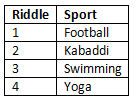
Let us speak
Page 121
Enact the roles of a parent and a child.
Situation 1: Coming home late after play. (Parent upset/Child explaining)
Ans: Parent: Why are you so late? You know you need to be home before dark!
Child: I’m sorry, Mom. We had an exciting game, and I lost track of time. I promise it won’t happen again.
Situation 2: Sharing details of the games you played. (Child excited/Parent asking details with interest)
Ans: Child: Today, we played an intense game of football, and our team won!
Parent: That’s great! Who scored the winning goal?
Situation 3: Bring a new friend home after playtime. (Child introducing/Parent welcoming)
Ans: Child: Mom, this is my new friend, Arjun. We played cricket together today.
Parent: Hello, Arjun! It’s nice to meet you. Welcome to our home.
Let us write
Q: Write a paragraph about your playtime, using the clues given below.
- What time do I go out to play?
- Who do I play with?
- What games do we play?
- Which is my favorite game?
- What do we gain from playing together?
- When do we finish playing and go home?
Ans: My Playtime
I go out to play every evening at 5 PM. I play with my friends from the neighborhood. We usually play games like football, hide and seek, and badminton. My favorite sport is football because it is very exciting and helps me to stay fit. Playing together helps us build teamwork and friendship. We finish playing and go home around 7 PM. I always look forward to my playtime because it is the best part of my day.
Let us Explore
Page 121
Q: There are many indigenous games in India. Kho-kho is an example of an indigenous game. Indigenous games are native to a region. Find out some native games of your state and other parts of India. Learn the rules of one such game and play it with your classmates under the supervision of your teacher.
Ans: Native Games:
- Kho-Kho (Maharashtra, Gujarat, Punjab): A popular traditional game where two teams chase and tag players of the opposing team.
- Kabaddi (Punjab, Tamil Nadu, Maharashtra): A contact sport where a raider tries to tag opponents while chanting “kabaddi” and return to their side without being tackled.
- Gilli-Danda (North India): Players use a small stick (Gilli) to strike a larger one (danda), scoring points based on distance and accuracy.
- Pachisi (North India): An ancient board game resembling modern-day Ludo, played with dice and strategy to move pieces around a board.
|
66 videos|531 docs|71 tests
|
FAQs on The Winner NCERT Solutions - English for Class 6
| 1. What is the main theme of the chapter "The Winner"? |  |
| 2. Who are the main characters in "The Winner"? |  |
| 3. What life lessons can be learned from "The Winner"? |  |
| 4. How does the setting influence the story in "The Winner"? |  |
| 5. How can students relate to the story of "The Winner" in their own lives? |  |





















